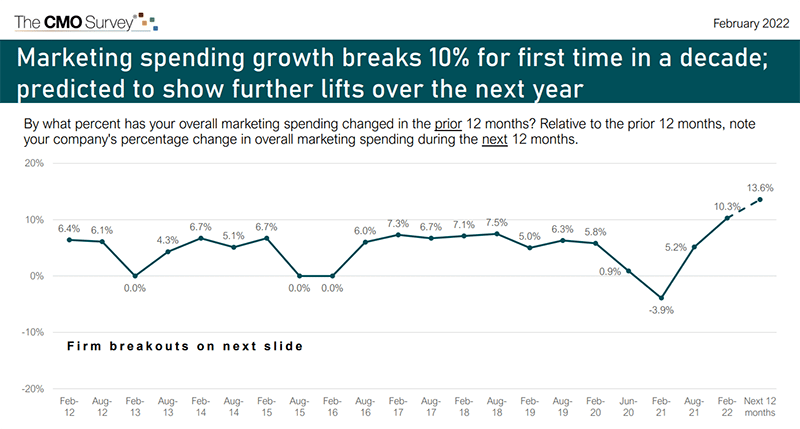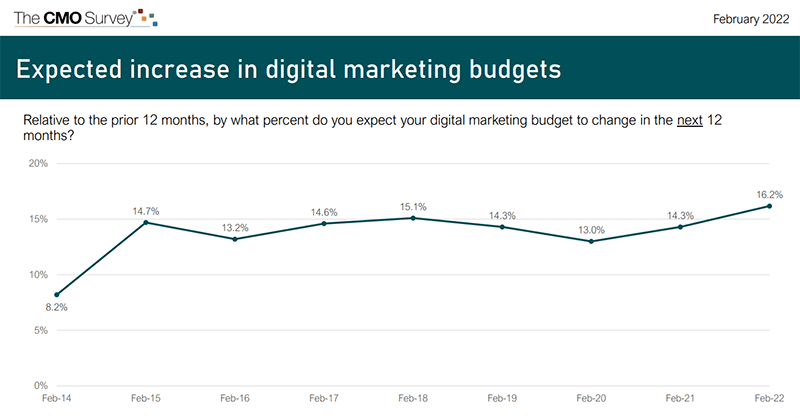Business investment in marketing these days is soaring, especially in digital marketing.
In fact, for the first time in a decade, marketing growth topped 10% from February 2021 to February 2022. According to the latest CMO Survey report, marketing spending grew by 11.8% compared to the previous 12 months. And it’s projected to grow even faster over the next year, to 13.6%.

The digital marketing channel specifically accounts for the bulk of that marketing spend, at 57.1%. According to that same report, digital marketing spend is expected to grow by a whopping 16.2% over the next year.

But how much of digital marketing spending goes toward search engine optimization?
In 2019, U.S. companies spent $73.38 billion on SEO out of a total of $776.30 billion for all digital marketing – roughly 9.5%, according to an earlier report by Borrell Associates.
Those who do SEO in-house (at least with local businesses) report higher costs and lower returns versus hiring a consultant and agency, which yields lower costs and higher returns, according to the report.
According to the report:
“Those who use third parties rate the third party’s effectiveness higher than their internal skill. SEO and web design/development particularly skew towards third parties being more effective.”
That said, SEO is an investment in your business’s future revenue. Think about it:
- What drives a business is sales.
- What drives sales is leads.
- Digital leads come in through a website.
- People find a website through impressions in the search results.
SEO allows businesses to own the top of the sales funnel: impressions of your website in the search results. And, some sectors find organic search drives 2x more revenue than other channels.
So what determines your SEO budget? I’ll touch on that next.
Factors that determine your SEO budget
What percentage of your budget should go toward SEO?
It’s not black and white, but the following factors should determine how much you invest:
- Your revenue
- Your competition
1. Your revenue
I recommend that the greater of $8,000 per month or 5% to 10% of your business revenue go toward SEO. In a highly competitive space, you should lean toward the high end. This is what you will see for businesses that are serious about competing.
Spending at least $8,000 a month usually allows for a good starting point with ample expert resources. At the high end, we have clients at six times that each month.
Also, consider how much money you’re putting toward paid advertising. For example, a national brand that runs PPC campaigns to attract new customers should spend approximately 25% as much additionally on organic SEO. The two channels complement each other to help drive website traffic.
I think it’s useful to say 25% of PPC spend, or at least $8,000 a month, is a reasonable estimate of SEO spending for companies that use ads.
2. Your competition
Consider that most search engine queries yield at least a million search results. And you have to be on Page 1 to even matter.
Any business that is competing in organic search has their work cut out for them. But, if you are in a difficult niche or are up against big brands with bigger budgets, you may have to work a little harder and faster.
This often requires a bump in your SEO budget. And you have to be willing to do this or risk being irrelevant in the search results.
How to decide your SEO budget
So you know that two basic factors influence your SEO budget: your revenue and your competition. Let’s put this into perspective.
We know that there is massive competition in the search results. So the question isn’t only: “How much do you want to spend on SEO?” But also: “How fast do you want to beat the competition?”
This is really what determines your budget. At a minimum, you should spend 5% to 10% of your revenue on SEO. But if you want to get ahead faster, you typically spend more.
That does not mean blindly investing in SEO with the promise that more money = better results.
But you do need resources. You need to know who you are hiring, and they need to have an excellent reputation and deep expertise.
If you’re using a third-party SEO agency, make sure you only hire experts. Unfortunately, many businesses settle for inexpensive SEO services. Cheap SEO is a near-death experience, and it will cost you more time and money to crawl out of the grave you’ve dug than if you were to invest in a healthy SEO strategy upfront.
With a nice budget that affords a true expert, you can learn how to make the most impactful SEO moves with the resources you have. And, if you can be more nimble than the competition in making those changes, you have a better chance of getting ahead.
If you are able, take advantage of downturns when possible. Those who do not have the knee-jerk reaction of pulling budget for digital marketing when the outlook is shaky will have the chance to ramp up and pass their competition.
Consider diverting budget to SEO
If your marketing budget is already maxed out on other channels, consider diverting some of your budget to SEO.
For instance, say you are spending a significant amount on PPC ads. Carving out 5% to 10% of that for SEO shouldn’t be an issue.
Especially when you consider how SEO trumps PPC on average conversion rates, you will thank yourself later. And, SEO has staying power for your brand’s presence online. You can’t say that for ads – if you turned off your advertising tomorrow, you’d have no residual value in the search results.
SEO is more cost-effective in the long run because your optimized webpages can continue driving traffic for years.
Yes, you must maintain leads coming in today (be it through PPC or something else), so I’m not suggesting you shut those activities off. But, if you have a good stream of leads coming in now, invest some of your budget into the future – and SEO will get you there.
The post What percentage of your budget should go toward SEO? appeared first on Search Engine Land.


